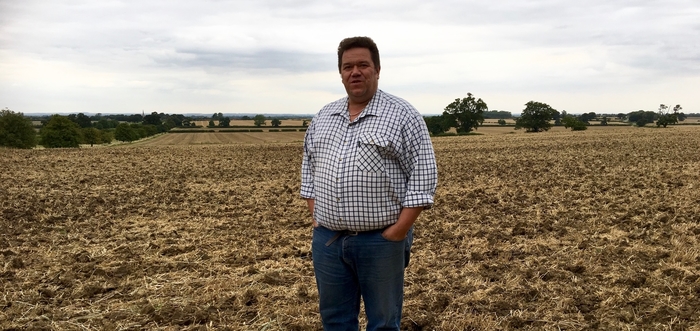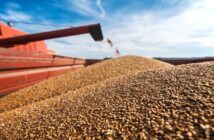An amino acid biostimulant called Bridgeway offers benefits for both non-organic and organic crops. In replicated and farm trials the product has delivered higher yields, bigger fruits and vegetables and improved quality traits, such as taste, colour and fruit firmness.
The product has been approved by The Organic Farmers and Growers and The Soil Association for unrestricted use on all organic agricultural and horticultural crops.
It is 100% plant-derived, and unlike most other amino acid biostimulants on the market, it doesn’t contain any animal by-products such as cow hide, blood and bone, making it also acceptable for use on crops produced for vegetarian and vegan consumers.
Bridgeway’s manufacturer, Interagro, likens this yield-boosting product to a vitamin drink for plants, boosting crop health, particularly during times of stress and critical phases of crop development.
“In ideal growing conditions, plants produce all 20 amino acids they need. They are the building blocks of every cell, so their synthesis is vital for plant fitness. Besides their usage during protein synthesis they also represent building blocks for several other biosynthesis pathways, play vital roles for signaling stress responses and contribute substantially to the energy state of cells under certain conditions,” explains Sarah Ferrie, Interagro’s marketing manager. “When conditions are sub-optimal, for example, during drought or on dull, cold days, photosynthesis is impeded along with amino acid production, at a time when more is needed.”
She says that Bridgeway offers a smart and safe way to boost the efficiency of a plant’s metabolism, safeguarding crop quality and yield that may otherwise have been compromised, adding that it is likely to be very useful this spring, following the exceptionally cold, wet and late start to the growing season.
“Soils are cold and wet, with low microbial and invertebrate activity, this will be a tough environment for seed to germinate and backward winter crops to catch up,” she suggests.
Bridgeway has been tested for the past two years across a wide range of crops in replicated trials and, for the past 12 months, by growers in their own commercial crops.
“Both growers and agronomists have been excited by Bridgeway’s arrival because it delivers both quality boosts and yield gains,” she notes.
In cereal crops, spring barley yielded between 0.18t/ha to 1.0t/ha more, in a range of trials, when treated with Bridgeway, whilst reducing brackling and a noticeable improvement in the crop’s canopy structure.
In a winter wheat crop treated at growth stage 31, 39 and 65, a 3t/ha yield boost was recorded along with noticeably more golden straw at harvest and an improvement in crop vigour in the following oilseed rape crop.
Farmer, Keith Challen, who also farms organically at Belvoir Estate, has trialled Bridgeway on elders and winter wheat.
“As we look to the future, our answers won’t come out of pesticide cans, we will have to farm smarter,” he says. “Plant health and stress reduction have to be front of mind as farmers chase wheat yields of 20 t/ha.”
“Biostimulants aren’t pesticides but offer a valuable opportunity to bolster plant health. When products like Bridgeway have this level of safety, that is good for industry and for growers, I believe that farmers have a responsibility to seek them out and try them,” he adds. “On paper Bridgeway was the best product so we were excited to try it.”
In 2017, Keith took an average field and applied 2.0 l/ha Bridgeway at the T1 fungicide timing, to two tramlines of 0.6 ha each in a crop of wheat – the variety was Marston. The crop exhibited no stress, did not succumb to drought on the farm’s clay soils and had a robust fungicide programme.
“The whole crop looked healthy, there were no visible differences that we could see during the season, but there was an uplift in yield from using Bridgeway of 0.4 t/ha and an extra £40/ha margin over cost,” he says. “Such margins are hard to ignore so Bridgeway will feature in all our crops in 2018, including our organic elders. We tested Bridgeway in our organic elders last year and got very pleasing results.”
Mr Challen grows 60 acres of elders and Belvoir is the largest producer of organic elders in the country, which go into the estate’s Belvoir drinks business.
“Elder is difficult to grow, particularly the cultivated varieties we have, which are not native to the UK. Our objectives are to achieve critical mass – big heavy flowers – as wellflower numbers. Spraying Bridgeway at 2.0 l/ha resulted in 15-25% bigger flowers, so this has prompted my decision to apply two doses of Bridgeway to all of our elders in 2018.”
Bridgeway is a liquid treatment that includes all of the 20 plant amino acids, 5% nitrogen and 17.5% biological, organic carbon, which also delivers an energy boost to growing crops, according to Mrs Ferrie.
She recommends that the product is applied at between 1.0-3.0l/ha, depending on the crop, at critical phases of growth and/or in stress conditions.




